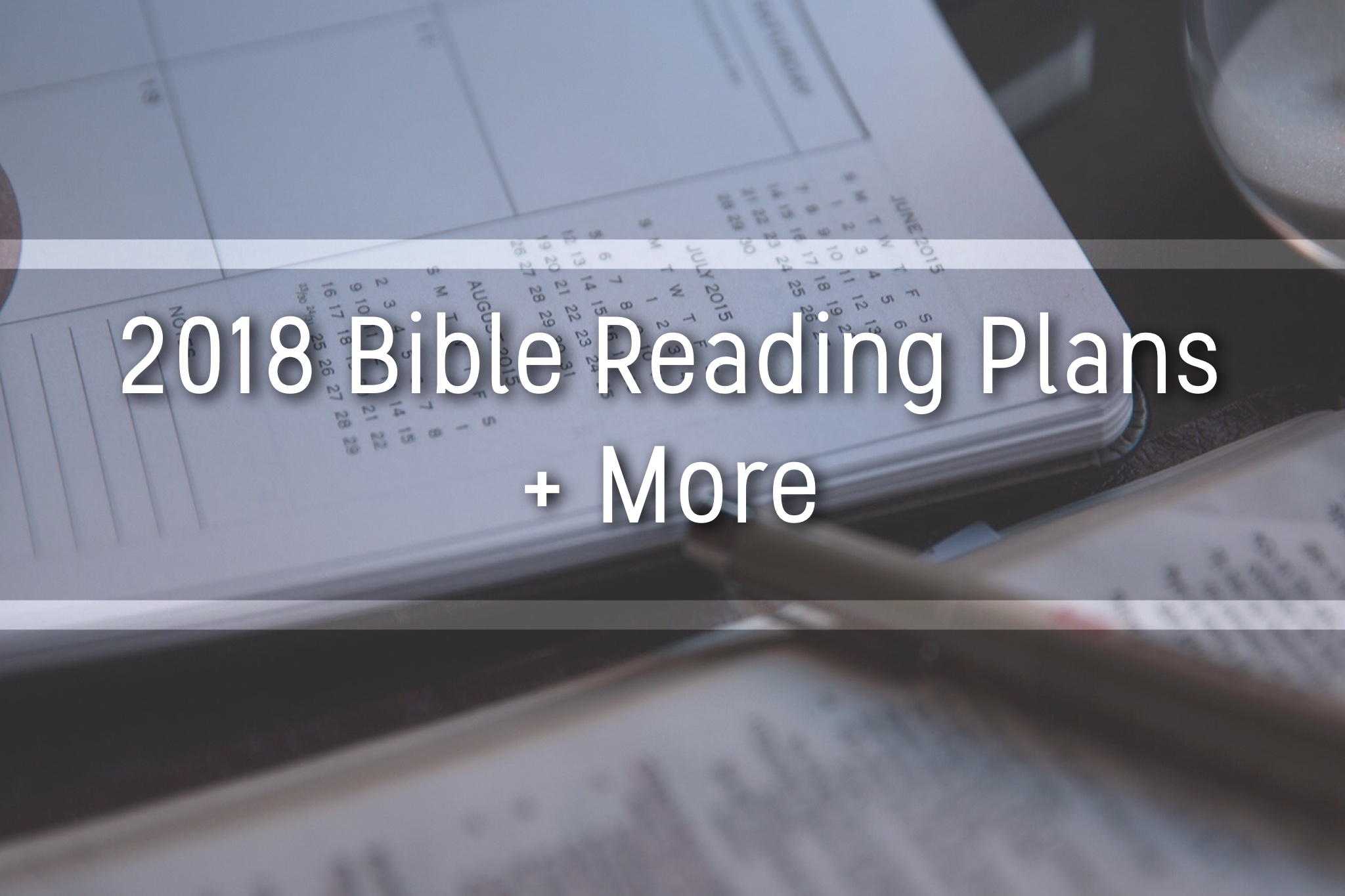2018 Update: This is a post originally written for the 2016 year. I’m updating it again for the third year. I’ve also included recommendations for a few devotionals to accompany your daily Bible reading, books to help you in your communion with God, as well as a recommendation for a book on productivity in the New Year. I hope this post helps you reach your goals!
And hey, before you get started, can I just be honest? I fell off my plan the past few months. In fact, you could say I’ve been completely undisciplined in this area. Perhaps you find yourself in a similar spot, maybe even ashamed because you couldn’t stick to your 2017 goal. The good news is, there is grace for us when we fail; grace that picks us up to keep going. Our Father is not ashamed of you for trying – and you shouldn’t be either.
I want to persuade you to start a personal Bible reading plan for 2018. But first, a personal anecdote.
I used to be one of those people who scoffed at the concept of Bible reading plans. All of these books and calendars that aim to help Christians read through the Bible in a certain length of time just seemed too “restrictive” to me. I had convinced myself that whenever I read the Bible, it needed to be something I felt like doing. Besides, if I try to read through the Bible in a year, how could I possibly study every intricate detail of each passage that I read? Instead, I told myself that it was better to study one book in depth at a time, so that I could learn it like the back of my hand.
Unfortunately, my excuses were just my own spiritual blindness and hard-heartedness. Between having convinced myself that Bible reading needed to come from the motivation of my emotion and feelings, combined with the fact that I wanted to read extremely slowly (and focus more on a commentary than the Biblical text itself) – the end result was that I read very little Bible. So little, in fact, that it wasn’t until recently that I actually read through the entire Bible.
Can you relate to making excuses as it pertains to reading your Bible? What excuses do you make? Does your job get in the way? Your kids? Is there “just not enough time in the day”? We all do it. My goal here is not to get you to feel down on yourself, but instead I want to encourage you by providing some practical reasons why you should use a Bible reading plan, as well as give you some practical helps on how to do this in 2018. Continue Reading
“My Study Bible notes say…”
“Well, MY Study Bible notes say…so I think..”
“MY Study Bible has history scholars in it and THEY say..so I think…”
A typical weeknight Bible study session. Or should I say, a Study Bible session.
The modern church has a deep-rooted but easily blinded problem: biblical illiteracy. In an age where the answers to our questions are just a Google search away, we quickly rely on whatever answers we can access the fastest. We look for answers before we know what question we are even asking, and readily accept information about the Bible before we’ve critically read the Bible for ourselves. We become a slave to what other people say about the text, rather than learning how to read for ourselves.
One of the worst culprits of this phenomena are Study Bibles. Now please don’t misunderstand me; I love Study Bibles, and I love all of the internet resources readily available at our fingertips. We truly live in a time where we are gifted with far more information than we know what to do with. The problem arises when we quickly accept all of this information without learning how to work for ourselves.
A church who does not engage critically with the Bible text themselves is a church who knows Bible facts without having a Bible heart. There is no life in facts. The Holy Spirit rewards us and brings us life and joy through our work and effort with the text, not in quick Google searches and Study Bible look-ups of the facts. We are unable to really respond to peoples questions and oppositions to a Christian worldview because we ourselves are just walking fact machines. We learn to rely on resources to answer peoples questions and not the Bible itself. Does Scripture say that it is Gods Word or resources about Gods Word that are useful for all things, including teaching and rebuke?
I’m not at all arguing for the elimination or removal of resources like commentaries and Study Bibles, quite the opposite as a matter of fact. Instead I am arguing for the church to learn where the proper place is for these resources. We should use these resources after we have learned how to think critically about the text for ourselves, not before.
Below are some suggestions I have for individuals and the church that I think would not only benefit our minds but our hearts. Learning how to think critically about the Bible for ourselves can only serve to increase our affections for Jesus.
1. Learn how to ask the right questions. God could’ve chosen not to leave any form of communication with us, but instead he left us the Bible. When we pause to think about that, our desire should be to learn how to interact with it! Here are some questions that might help you engage with the Biblical text:
– How does this passage or topic fit into the grand narrative of scripture (Creation, Fall, Redemption, Restoration)?
– What is distinctively Christian about how I am reading this passage or engaging this topic? Note: Our Bible studies, sermons and readings are not Christian because they use the name of Jesus or reference scripture. Cults, heretics and even atheists can do that.
– What does this passage or topic tell me about Jesus?
– Does this passage or topic point forward to the cross, backward to the cross, or forward to Christ’s return? How?
– How does this passage or topic equip God’s people to live on mission?
2. Put down the Study Bible, turn off the internet and engage just with the Biblical text. Allow time for the Bible to speak for itself, engage and think about everything you know in light of the current text. After you’ve spent time engaging with the text on its own, make a list of your questions that remain unanswered. Then take these questions and open your Study Bible, internet resources and commentaries.
3. Leave the Study Bible at home. When we bring our Study Bibles to church gatherings, sermons and Bible studies the temptation is to rely on our notes rather than engage with others on the text.
4. Churches: teach your people HOW to ask the questions. One of the primary responsibilities of a local church should be teaching her people how to engage with God’s written Word.
5. Try to read at least one resource a year on engaging with the Bible. Here are a few recommendations:
– The God who is There: Finding Your Place in God’s Story by D.A. Carson
– From Creation to New Creation: Making Sense of the Whole Bible Story by Tim Chester
– Jesus on Every Page by David Murray
– New Testament Exegesis by Gordon Fee
1) 4 Reasons the Gospels Could Not Be Legends
I don’t believe in Jesus based on blind faith. I believe in Jesus for the same reason these first believers did: because I am convinced the testimony of the apostles is true, that Jesus really did resurrect from the dead. And if Jesus really is alive, that changes everything.
2) Where Did All These Calvinists Come From?
The contemporary resurgence of Calvinism is a phenomenon many celebrate, many lament, but none can deny. May Christ grant us grace to press forward in a hostile world with truth, humility, unity, and love.
In my nearly 30 years at universities, I have seen a lot of very talented people fail because they couldn’t, or didn’t, write. And some much less talented people (I see one in the mirror every morning) have done OK because they learned how to write.
4) The Safe Place for Our Kids Shameful Questions
This lays down a challenge for parents. More than ever, you need to open the channels of communication with your children so they know you are safer and wiser even than the search engines. More than ever, you need to ask them questions and to invite them to ask you questions. And all the while, you simply have to be aware of what they are searching for, and what questions they are taking to the all-knowing Google.
5) Beautiful Eulogy’s Newest Album
JUST DOWNLOAD THIS!
October 27 always makes me feel vulnerable and weak. I remember what it’s like to be that kid who wonders if God would really have me, with all my hypocrisy. It reminds me what it feels like to be a dying thief, gasping for mercy, even if my crimes were all covered over with Southern Baptist Bible School perfect attendance awards.
But October 27 also makes me remember what it feels like for a half-executed robber to see the Man on that middle cross turn, and look, and hear, and save. All I have for that is gratitude. And I pray for the broken heart to listen for the cries of the perishing.
7) 9 Things You Should Know About Persecution of Christians in 2013
In August 2013, Egypt faced what has been called the the worst anti-Christian violence in seven centuries: 38 churches were destroyed, 23 vandalized; 58 homes were burned and looted and 85 shops, 16 pharmacies and 3 hotels were demolished; 6 Christians were killed in the violence and 7 were kidnapped.
8) 5 Differences Between Catholic Theology and the Gospel
Certainly on just about every single area of theology there are differences, but here are what I think are the five most glaring and significant issues that separate the Catholic Church from the gospel of grace.
This post is a continuation in a series:
—–
Ascribe to the Lord, O heavenly beings,
ascribe to the Lord glory and strength.
Ascribe to the Lord the glory due his name;
worship the Lord in the splendor of holiness. – Psalm 29:1-2, ESV
I’m continuing this series today not so much with a principle, rather with a practice. This practice is a discipline and an exercise, and something I am not at all perfect at. This is a discipline very closely related to my first post in the series (Everything Must Point to the Gospel). Whenever I am reading and studying any text in the Bible, I try to answer the following question:
What reading and understanding of these verses or passages gives God the most glory, honor and praise?
Our God is in himself beyond comprehension in his holiness and perfection. He is the creator of all things, seen and unseen. He is completely sovereign over all things. He is so caring and loving that he would sacrifice himself for sinners who are running far from him.
Words cannot describe his beauty and magnificence! Truly, there is nothing or no one like him. It is because of his goodness, perfection, power and holiness that he is absolutely deserving of our glory, honor and praise. But what does that look like for us? Part of becoming Christian is realizing that we don’t give God the glory he deserves on a daily basis. At its root, this tendency comes from our sinful nature. We all have it, and we all do it. This sinful nature is something that only God through the Holy Spirit can remedy in us. Only he melts hearts, and only he draws sinners to himself.
So what then is our responsibility? God has left his Word with us, the Bible. This Bible is absolutely littered and saturated with descriptions of God as glorious, holy and worthy of praise. Seriously, just do a word or index search on any of those words and it is everywhere. What do we do with that? How should that impact our reading of the Scriptures?
Our handling of the Biblical text must ultimately point to God’s glory, his holiness, his goodness, and lead us to honor and praise him in everything we do. If we do anything but that, then we are making a mockery of who He is. If we seek to undermine the text, write it off as not authoritative, explain it away, read ourselves into the text and make it all about us, or anything of the sort then we are staining something that is perfect and holy.
All that to say, I’ve found the discipline and practice of trying to answer the bolded question very helpful, practical and biblical in my Christian walk. Perhaps a common example of this concept might help. One passage and its interpretation that has completely changed by my application of this discipline is Matthew 14:22-32. In this passage, Jesus comes to the disciples in a storm while walking on water. The climax of this passage is Peter being commanded by Jesus to come out to him on the waves, but watch out! The wind and the waves cause Peter to become afraid and he starts to sink in the water. The passage concludes with Jesus asking “O you of little faith, why did you doubt?”
The most common application of this passage that I’ve heard goes something like this: you and I are Peter, and the wind and the waves are all of life’s problems – stop looking around at the waves, and start looking at Jesus. Even typing that summary makes me a little nauseous. Is that really what this passage is about? I believe that application serves to demean and exalt ourselves by reading us into the passage. That isn’t to say that God doesn’t care about our problems, and that he isn’t Lord over our circumstances, because he certainly is – this just isn’t the passage to make that point (more on this in part 5).
This passage must be and is about God’s glory. And his glory is on display through the demonstration of Christ’s divinity and control over nature, the properties of matter, gravity, etc. He is power. Moreover, this passage displays Christ’s sovereignty in those whom he calls to himself. Peter acknowledges that it is Christ who does the calling, and he is incapable of coming unless it is granted to him by Christ. God’s divinity and his sovereignty are what are on display in this passage, and nothing less.
Just like anyone else, I am imperfect in much of my understanding of the Scriptures. I have my weaknesses and my blind spots, and I often err in my understanding. However, I think this practice is a helpful one. If there is one thing we can be confident on it is this: we can never give God too much credit, too much honor, and too much praise. He is worthy of it all.
To our God and Father be glory forever and ever. Amen. – Philippians 4:20, ESV





